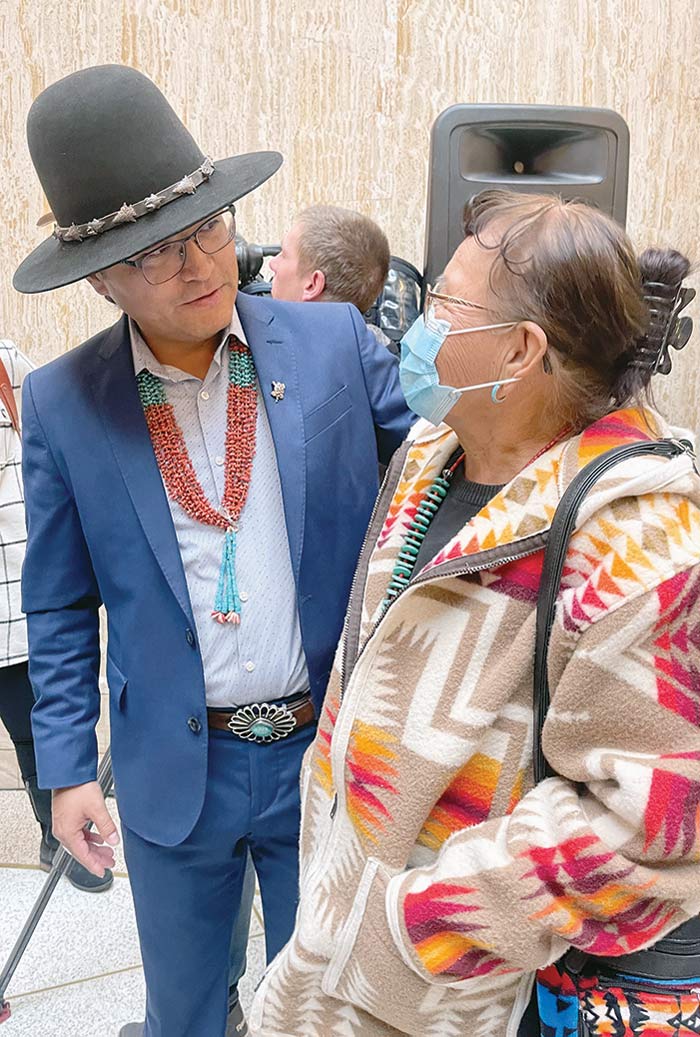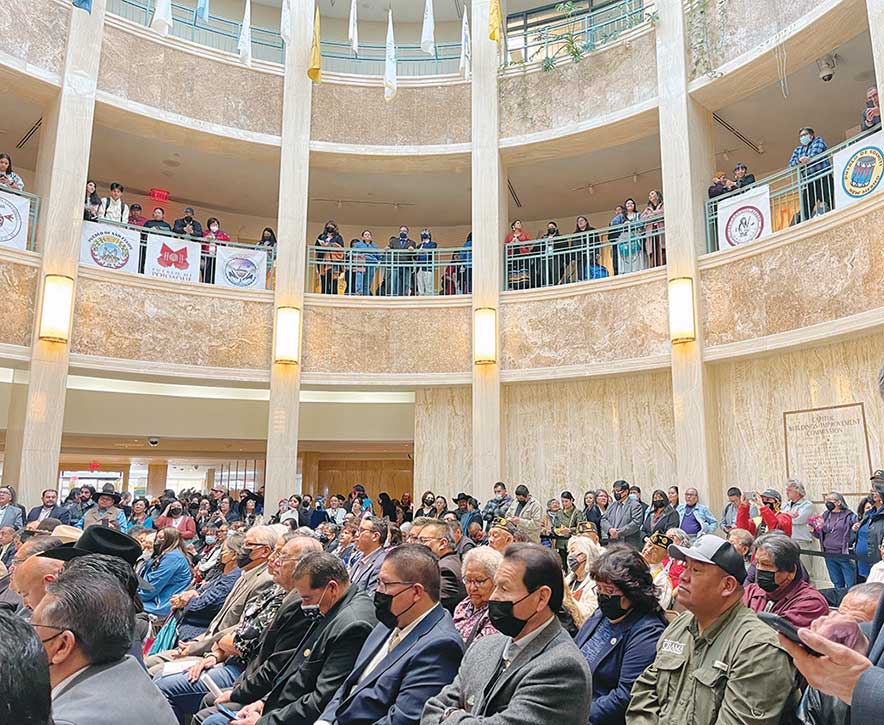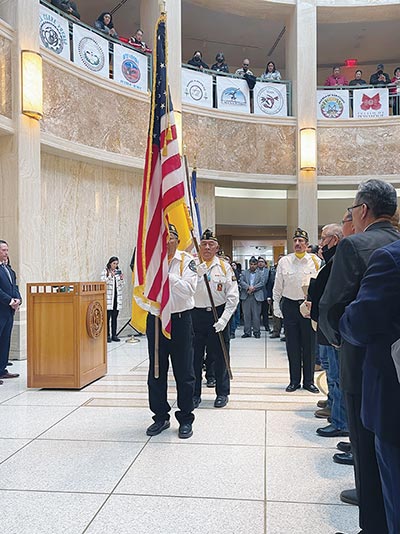
New Mexico’s 56th Legislature declares first Friday of February as American Indian Day
By Chael Moore
Special to the Times
SANTA FE, N.M.
The roundhouse within the New Mexico state capitol was filled to capacity, leaving standing room only as elders, youth, and leaders, both state and tribal from surrounding communities. They gathered Feb. 3 to celebrate American Indian Day.
“Paving the Way for the Future: Centering and Uplifting Indigenous Voices” is this year’s theme for American Indian Day at the state Legislature. For many, this is a continuation of strengthening the relationships between tribal governments and their communities with elected state officials in New Mexico.

Special to the Times | Chael Moore
Navajo Nation President Buu Nygren greets and listens to Native elders who attended American Indian Day at the conclusion of the event Feb. 3.
The morning opened with a posting of colors by the Pueblo of Acoma American Legion Post 116, followed by the national anthem sung by Noel McCoy from the Chemehuevi Indian Tribe and citizen of the Potawatomi Nation. The Pledge of Allegiance was then presented by Alvino Sandoval’s Navajo class from Santa Fe Indian School.
The Cloud Eagle Singers from the Pueblos of Jemez and Zuni performed an honor song to commemorate the morning.
American Indian Day has previously been recognized for multiple years on various dates. However, the 56th New Mexico State Legislature and re-elected New Mexico Gov. Michelle Lujan Grisham officially declared the first Friday of February American Indian Day for its 23 federally recognized tribes.
Paving the way for the future
About “paving the way for the future,” Grisham ensured that her new administration would not neglect the recognition of tribal sovereignty and its respect for tribal nations. She strives to encourage future administrations to do the same as she addressed those in attendance Friday morning during her proclamation and remarks speech.

Special to the Times | Chael Moore
Tribal leaders and the public fill the seats of the New Mexico state capitol as re-elected Gov. Michelle Lujan Grisham presents her remarks and the American Indian Day proclamation.
She addressed topics such as education reform, veteran assistance, food security, and renewable energy.
Grisham recognized the efforts made by many tribal leaders and government officials in education who helped to establish free college tuition for residents in the state and discussed the importance of reclaiming renewable energy.
“It belongs to you,” Grisham said regarding solar and renewable energy should be owned, operated, and controlled by every sovereign nation in the state, ultimately granting the job to the state’s Indian Affairs Department for future implementation.
Grisham recognized the sacrifices made by Native veterans, followed by a standing ovation for those who served. Plans for establishing a New Mexico Code Talker Museum to honor those sacrifices were mentioned as a commitment to cover the out-of-pocket costs that honor guards typically must pay for their attire, training, and equipment.
“It’ll no longer be the responsibility of the veteran but the responsibility of the state of New Mexico,” Grisham said.
She also shared plans to offer free universal meals and healthy choices within every school in the state, making it the first state to do so. Thus, emphasizing the importance of food security, especially for tribal communities.
Lastly, Grisham spoke of the importance of early childhood education and how it is crucial to cultural preservation. She recognized the Pueblo of Jemez’s investment in its early childhood education and hopes it will become a testament to the other Pueblo, Apache, and Navajo communities across the state to do the same.
“When we stand up for dignity and independence, self-determination, and respect, we have to start treating our children and their families the same way,” Grisham said regarding the importance of investing in early childhood education.
“It will, in fact, change and preserve the culture and the language for every sovereign nation in the state of New Mexico,” Grisham continued.
There is no doubt that there are some challenges to come, such as securing water rights for sovereign nations, broadband access, public safety, and creating a bold and opportunistic future, according to Grisham, but together that can be achieved over the next four years.
Before Grisham’s closing remarks, the state governor appointed James R. Mountain, the former governor of Pueblo de San Ildefonso, to lead and be secretary of the New Mexico Indian Affairs Department, where he will be working with the state’s tribal nations.
Centering and uplifting Indigenous voices

Special to the Times | Chael Moore
The Pueblo of Acoma American Legion Post 116 conducts the retiring of colors, concluding the celebration of American Indian Day in Santa Fe on Friday morning.
The New Mexico Legislature’s American Indian Day written proclamation was read on Friday morning, acknowledging the 23 federally recognized tribes and eight spoken Indigenous languages within the state. The proclamation gave gratitude and recognized the many vital contributions that tribal communities in the state have made toward economic development, cultural preservation, and more.
It recognized the challenges tribal communities have encountered throughout history and their resilience to prosper. The proclamation hopes to promote mutual respect and support for tribal self-determination. The full proclamation can be found on the state Legislature’s government website.
The celebration brought together students from local schools, elders, royalty, parents, and youth of the 23 federally recognized tribes to witness government-to-government engagement at the state and tribal levels.
Tribal officials, including Chairman Mark Mitchell from the All-Pueblo Council of Governors, President Eddie Martinez from the Mescalero Apache Tribe, President Edward Velarde of the Jicarilla Apache Nation, and President Buu Nygren of the Navajo Nation gave their remarks following Grisham.
Nygren shared his thanks to the state governors, representatives, staff, and colleagues for dedicating the day to the tribes within the state. In his remarks speech, Nygren said he is looking forward to collaborating with his fellow tribal leaders and attending the New Mexico Legislature sessions to produce creative solutions.
“I think the most important thing is to always be proud of where you come from, whatever tribal nation that you represent. First and foremost, let’s honor our language, honor our culture, honor our nation. I think that’s a unifying message to all, whether you’re a little one all the way to an elder,” Nygren said when asked how he plans to honor this year’s theme in an interview with the Navajo Times.
“I think it’s great to have 23 nations under one roof; it’s spectacular. I think that it just shows that the state of New Mexico has a strong commitment to working with tribal nations, and that makes me happy, humble, and proud to be part of today,” Nygren said.
Nygren plans to work closely with Grisham on issues that will require immediate action this upcoming year, including but not limited to the missing and murdered epidemic and New Mexico outlay funds, which are the government funds New Mexico allocates to the Navajo Nation.
Alysia Coriz, a member of Kewa Pueblo (formerly known as Santo Domingo Pueblo), was one of many Indigenous royalties attending American Indian Day at the capitol. Coriz is currently the 2022-23 Miss Indian New Mexico LIV (45) and serves as co-chair of the All-Pueblo Council of Governor’s Youth Committee. Additionally, she is the co-founder and Pueblo representative for the inaugural State of New Mexico Indigenous Youth Council, among other achievements.
“American Indian Day is such a beautiful time for all of our nations to come together in this great state that we call New Mexico to remember and honor the ancestral lands that our own communities call home,” Coriz said.
As a member of the state’s IYC, Coriz helped create this year’s theme of “paving the way for the future” for the government to remember its responsibility to future generations. She further recognizes that change comes in many ways when asked what she hopes leaders will take away from the day and its theme in an interview with the Navajo Times.
“Change comes in many different ways, whether that’s from the state legislature, through policies, even from the ground up from our amazing community members that are doing direct action work. It’s all part of the collaboration and connections that we must have in order to make our communities a better place for us to grow and be part of the solution,” Coriz said.
Coriz hopes that the theme encourages leaders, tribal, state, and federal, to come together with Native communities to listen and continue to engage in these conversations and ultimately turn those conversations into action moving forward.
The morning was closed with the retiring colors and a luncheon hosted at the Santa Fe Indian School. The 2023 state Legislature had its opening day Jan. 17 and will follow a 60-day session timeline also known as a “full session” which will conclude on March 18.








 Highway 264,
Highway 264, I-40, WB @ Winslow
I-40, WB @ Winslow